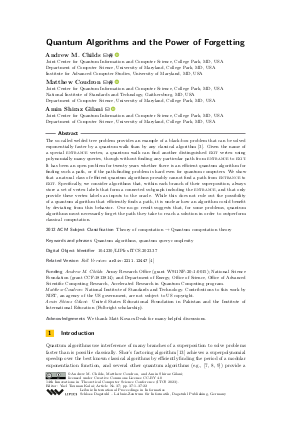@InProceedings{childs_et_al:LIPIcs.ITCS.2023.37,
author = {Childs, Andrew M. and Coudron, Matthew and Gilani, Amin Shiraz},
title = {{Quantum Algorithms and the Power of Forgetting}},
booktitle = {14th Innovations in Theoretical Computer Science Conference (ITCS 2023)},
pages = {37:1--37:22},
series = {Leibniz International Proceedings in Informatics (LIPIcs)},
ISBN = {978-3-95977-263-1},
ISSN = {1868-8969},
year = {2023},
volume = {251},
editor = {Tauman Kalai, Yael},
publisher = {Schloss Dagstuhl -- Leibniz-Zentrum f{\"u}r Informatik},
address = {Dagstuhl, Germany},
URL = {https://drops-dev.dagstuhl.de/entities/document/10.4230/LIPIcs.ITCS.2023.37},
URN = {urn:nbn:de:0030-drops-175408},
doi = {10.4230/LIPIcs.ITCS.2023.37},
annote = {Keywords: Quantum algorithms, quantum query complexity}
}

 Creative Commons Attribution 4.0 International license
Creative Commons Attribution 4.0 International license

